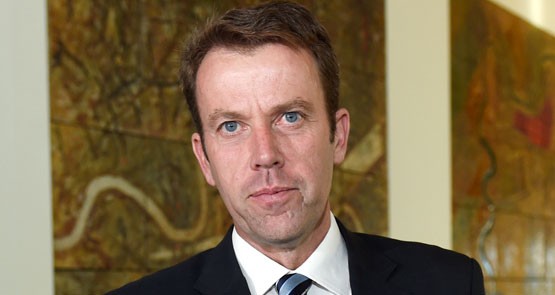
The chair of Parliament’s Joint Committee on Intelligence and Security, Liberal backbencher Dan Tehan, is in an increasingly untenable position as he once again takes the lead on, and advocates for, counter-terrorism laws that the committee will be charged with independently assessing.
In the last 24 hours, Tehan has urged new indefinite detention laws that would keep people convicted of terrorism offences who remain “unrepentant” in jail beyond the expiry of their sentence, “like paedophiles”. Prime Minister Malcolm Turnbull will present the proposal to state and territory leaders at today’s Council of Australian Governments meeting. How a lack of repentance would be tested is unclear, given a convicted terrorist eager to strike again could easily feign remorse and be released having served his or her judicially imposed sentence.
This is the second time this year Tehan has come out in advance of the government itself committing to such laws and called for them, in effect appearing to initiate legislative proposals. In May, Tehan called for the stripping of citizenship for convicted and suspected terrorists a week before Tony Abbott and Peter Dutton sprang the same proposal on cabinet (in a meeting that was heavily leaked and further destabilised Tony Abbott’s leadership). Earlier this year, Tehan also lauded the government’s data retention laws while the committee was still conducting an inquiry into them.
Either Tehan has acted as a stalking horse for legislative proposals already developed by the government, or he has himself initiated them. Either role is fundamentally at odds with his role as chair of the Joint Committee of Intelligence and Security in its current form. JCIS now is the de facto legislative review process for national security reforms, with this government following the lead of the previous Labor government in referring proposed national security reforms to JCIS for consideration prior to passage through Parliament. Tehan’s self-appointed role as proponent of national security reforms means he will chair inquiries into bills that he himself has initiated, called for or advocated, undermining the independence of the committee and casting serious doubt over the integrity of the committee’s findings into those bills.
It also places other committee members, such as Liberal Senator David Fawcett or Labor deputy chair Anthony Byrne, who have consistently taken seriously the committee’s role to independently evaluate the bills before them, in a difficult position given Tehan’s prejudgement of the issues.
The use of Tehan as a stalking horse for legislation isn’t the only way that the Turnbull government is conducting national security in a similar manner to the Abbott government: it seems there will continue to be “tranches” of ever-more draconian laws and ever-greater security powers so that the appearance of being tough on, and doing something about, national security is permanently in the policy space. And while data retention was undoubtedly a long-term goal for security agencies, there’s a real question about how much of the push for yet more laws is coming from security agencies. The inquiry into Tehan’s citizenship-stripping laws revealed that officials had not even spoken to their counterparts in allied countries on how they felt about the possibility of Australia dumping its terrorists on them; it also showed that officials were confused about exactly what sort of process would actually be used to strip citizenship. The political nature of the bill, rather than having its origins in the genuine needs of security agencies, became clear.
There may be another connection between the citizenship-stripping laws and Tehan’s latest proposal. Some suspect that the government has realised the citizenship laws won’t work — either they’ll be struck down by the High Court or their targets will find ways to evade being stripped of their citizenship. The answer? Indefinite detention, rather than dumping them on other countries. It will be interesting to see what Tehan comes up with if indefinite detention doesn’t work out. Whatever it is, he should be advocating for it as a backbencher or a minister, not as the chair of the only serious parliamentary national security oversight mechanism Australia has.








Well, if indefinite incarceration doesn’t get up, perhaps compulsory implanted GPS tracking devices for convicted terrorists? If they don’t already exist, then perhaps funding for them could be provided through the innovation program. There’s a lot of states who’d be interested such a device, providing sorely needed foreign exchange. North Korea, for one, springs to mind as a potential customer.
If Tehan is a stalking horse, I suppose Tony rAbbott is a stalker of the Tunbull government.
I saw tehan, for the first – hopefully only – time a couple weeks ago on the Drum and I wondered what the point of him was.
He had a very limited understanding of security, much less legislation or intelligence and very quickly came to the end of his rote script and, literally, began to repeat, to the comma, his previous boilerplate before his recital was cut off.
He looked relieved, as if even he knew what a dork & dimwit he seemed.
Don’t we already have indefinite detention for people on off shore islands? What difference will it make if we lock up some more people forever?
It is a boon for Serco and all the other providers, they must contribute generously to the Liberal Party.
How much more of this stuff will Australians put up with before they dawn that we are becoming like nazi Germany? Probably until it starts to affect us.